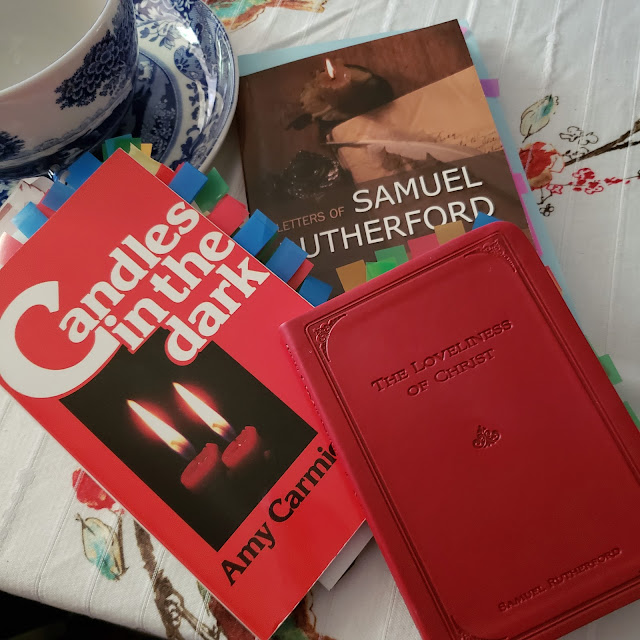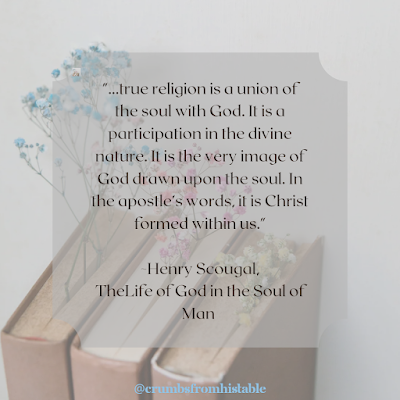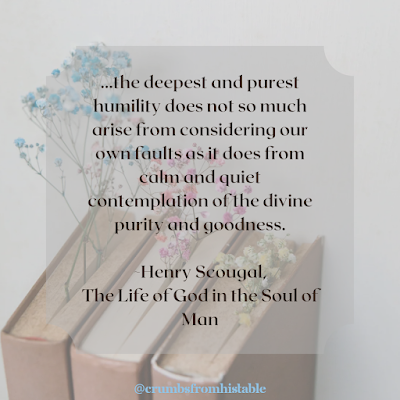Of the books I've read so far in 2022, my two favorites are classic Christian books perfect for short attention spans. If you, like me, value the wisdom of saints who have already preceded us into glory, but due to the speed of life or the weight of affliction don't have time and focus for, say, Jonathan Edwards's Religious Affections or even Henry Scougal's small book The Life of God in the Soul of Man, you might find a good book-friend in Amy Carmichael's Candles in the Dark or The Loveliness of Christ by Samuel Rutherford.
The letters of Samuel Rutherford, though written four and a half centuries ago, still strengthen and encourage me. He suffered the usual bereavements and difficulties of life but also persecution and imprisonment for holding steadfastly to the gospel of grace. Unfortunately, the Puritan language takes concentration and mental energy that, frankly, I lack in the current season. A kind editor named Ellen S. Lister mined the letters for us and collected the brightest gems of highlights in a pretty, wee volume called The Loveliness of Christ. A reader can turn to any page and scan through one sentence or four, one short paragraph or a pair of them. They are not organized by theme or logic, so this is truly a book that can be read one sentence at a time over many weeks with no loss of comprehension.
For example, on page 19 one finds these two treasures:
God hath made many fair flowers, but the fairest of them all is heaven, and the flower of all flowers is Christ.
and again,
When we shall come home and enter to the possession of our Brother's fair kingdom, and when our heads shall find the weight of the eternal crown of glory, and when we shall look back to pains and sufferings; then shall we see life and sorrow to be less than one step or stride from a prison to glory; and that our little inch of time—suffering is not worthy of our first night's welcome home to heaven.
On every page, the reader can be certain of finding the love of Christ and hope in trials.
 |
The entries in Candles in the Dark are a bit longer, a few paragraphs each, but still shorter than a classic devotional book like Streams in the Desert or My Utmost for His Highest. This book also is a compilation of letters, specifically personal notes Amy Carmichael wrote from her bed of pain, alone in her sickroom the last twenty years of her life. In that season, her pen became her platform, both her means of ministry and her doorway to communion with the able-bodied world.
As you can see from the photos, the number of sticky flags verges on the ridiculous. When that many pages are highlighted, the highlights don't signify much, do they? I didn't tidy them before the photo so you would see how much I love in this book. It's a reread, actually, from a small family-owned Christian bookstore in Dallas which hasn't existed for decades, but which I haunted in my early twenties. Much of my Amy Carmichael shelf comes from Lamplight.
But I digress.
These letters are categorized by theme and need not be read in any particular order. Each entry stands on its own merit without depending on its neighbors for context. Here is one of my favorites, to which my thoughts have often returned of late.
As I think of you I think of words written y one who warred and suffered about six hundred years ago, Raymond Lull. 'Say, O Lover,' asked the Beloved [Christ Jesus], 'if I double thy trials, wilt thou still be patient?' 'Yea,' answered the Lover, 'so that Thou double also my love.' I am quite sure that the Beloved will double the love of his Lover, if at any time He doubles the trials.
I think also of those words in Hebrews that go to the depths of all suffering and 'speak to our condition' when no others seem to touch us: Hebrews 2.10, 'For it became Him...in bringing many sons unto glory to make the Captain of their salvation perfect through suffering.' I am writing on the day after you knew that this joy of joys had been given to you—the joy, I mean, of bringing a dear child into the way of glory.
I give you Hebrews 10.35, 36 for the worst days that will ever come. 'Cast not away therefore your confidence, which hath great recompense of reward. For ye have need of patience, that, having done the will of God, ye may receive the promise.' I commit you to Him who bequeathed His peace to us just before He faced His cross. I commit you to Him who is your best beloved. He will never leave thee or forsake thee; the work of righteousness (which is obedience) shall be peace, and the effect of righteousness quietness and assurance for ever (102).
This small paperback overflows with concentrated encouragement, comfort, hope, love, and joy. As typical of Amy Carmichael, there are challenges to take up the cross and follow our Savior too, but for the most part this is a book to uphold the hurting soul.
If you have read these, I'd love to hear your thoughts or favorite selection. If you have not, Candles and Loveliness are very accessible entries to a pair of wise saints refined by suffering. May the Lord bless these excerpts and the books to your walk with Christ.
{Amazon links are affiliate links and will generate a small commission for the writer at no additional cost to you.}









